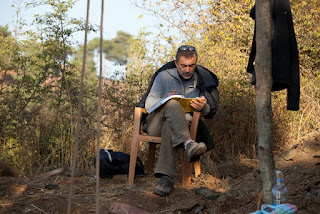He had written and directed epochals such as: Once Upon a Time in Anatolia
or Winter Sleep.
or Winter Sleep.
Now Nuri Bilge Ceylan's The Wild Pear Tree
paints a fascinating portrait
of the struggle and resentment of Turkish youth,
resulting from lack of job opportunities
and crushing under the weight
and crushing under the weight
of family debts.
It’s a coming of age movie,
of someone who has already came of age.
It charts the growing pains of an artist,
and his search for belonging
in a world that feels
too small
for him.
Set in a small Turkish village,
The Wild Pear Tree follows a young man
The Wild Pear Tree follows a young man
who returns to his hometown
after graduating.
He wants to be a writer.
He wants to be a writer.
He has Already finished his manuscript,
and now
and now
he attempts to get it published.
He looks for local sponsors
He looks for local sponsors
and scrapes money of his own,
when he can’t find any.
But his father’s debts
when he can’t find any.
But his father’s debts
soon catch up with him.
Co-written & directed by Nuri Bilge Ceylan, the film is slow.
Patient.
Patient.
Methodical in its approach,
as expected.
as expected.
The entire film is an exercise in showing
rather than telling.
Told through the eyes of Sinan,
his writer’s imagination leads to dream sequences of heart-stopping proportions,
perfectly balancing
the real
with the fantastical.
It fits so harmoniously with the film
as a whole
as it never once disrupts
the flow of the narrative.
But the plot is a tad too drawn out.
Ceylan’s direction presents a certain level of comfort.
His sketching of the mundanities of everyday life
remain as captivating as always,
but they are also overly stretched.
The story ruminates on love,
fate,
morality,
religion,
unemployment & abandonment
fate,
morality,
religion,
unemployment & abandonment
through the eyes of our protagonist,
who often comes across as arrogant,
insolent & condescending.
Whereas it is a proper reflection of young adults
who reject the wisdom & advice of previous generations,
consider themselves morally superior to others,
consider themselves morally superior to others,
and think they know how the world works,
until life knocks some sense into them.
However,
it is the father-son relationship
it is the father-son relationship
that the film bases its narrative on.
This aspect is finely executed,
keeping our interest alive
until the end
until the end
with their love-hate dynamic.
The static camerawork allows room for more thoughts
and follows our protagonist at all times.
Yes its 188 minutes runtime is excessive,
and its severity is felt
sooner or later.
sooner or later.
Editing is a mixed bag too,
for the jump cuts are jarring
while several extended segments
end abruptly.
end abruptly.
All the actors are committed to their roles,
play their part responsibly
& are thoroughly convincing.
& are thoroughly convincing.
Even the supporting characters with limited screen time
exhibit sufficient depth,
thanks to excellent writing
& lifelike characterisation.
& lifelike characterisation.
Ceylan provides ample space
for primary characters to breathe
for primary characters to breathe
yet their arcs appear stifled
for the most part
for the most part
before coming full circle
in the end.
in the end.
On an overall scale,
The Wild Pear Tree provides an interesting glimpse into the life of modern Turkey,
The Wild Pear Tree provides an interesting glimpse into the life of modern Turkey,
and makes for an absorbing character study
of a young man
of a young man
who finds himself being dragged towards a destiny
he cannot embrace.
While there are moments
that present the esteemed Turkish auteur
in control of his craft,
there are also times
when he slips up
and allows few segments
to either go on for too long
to either go on for too long
or cuts before they have run their course.
Everything about this film works out
to create something unbearably real,
hard to watch
but harder to look away.
It’s a honest portrayal of the artist
and their place in the world,
in the worlds we create
and the worlds we exist in.
The Wild Pear Tree is a must-see for everyone,
but particularly for artists,
young and old.
From its message to its crafting,
you’ll walk out feeling understood,
not alone
and maybe even inspired.
Giulia Dobre

















